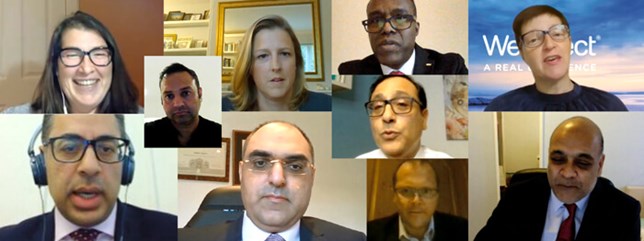Towards the end of 2019 the team at Urology News began making plans for our first event. An educational study day focusing on how to improve patient engagement in urology was to be held in Edinburgh at the end of September.
Of course, the COVID-19 pandemic forced us to rethink and so the idea for a series of three virtual Patient Engagement Evenings was born. Over the course of the three evenings a total of 108 delegates listened to some fantastic presentations from our expert faculty.

Urology News Editor Jay Khastgir kicked off the event on Wednesday 23 September with his talk on ‘Online support for incontinence sufferers’. The internet can be a valuable source of healthcare information and peer-support via social media which has helped many individuals with practical aspects of care from the unique patients’ perspective, as well as a source of advocacy and general support. Jay shared a successful Swedish example of how internet and App-based treatment of SUI can be effective. However, one of the drawbacks of healthcare information is the lack of moderation of content on platforms, which enables introduction of personal bias and misleading information to be introduced into the conversation. Professionals will need to take care to follow guidelines on professionalism on social media to develop better online support systems for patients.
Jay’s excellent talk was followed by Professor James N’Dow who clearly inspired the audience with his presentation ‘Thinking local in patient support delivery; the UCAN example’. This was a fantastic example of how a charity, developed by urologists in Aberdeen gathered wide support from the community to make an extremely positive impact on patients’ lives and has now become an international template for excellence of care.
Ben Ayres then gave us a comprehensive and informative account of bladder cancer management using radiofrequency-induced thermochemotherapy. The team at St George’s Hospital have been using this treatment in BCG-unresponsive high-risk NMIBC patients for the last 14 years but Ben’s presentation focused particularly on the challenges throughout COVID-19.
The final presentation of the evening was a humbling and inspiring conversation between Majid Shabbir and a patient with sickle cell disease, providing delegates with a new perspective on all aspects of the condition, not just those of a urological nature. The patient emphasised the importance of raising awareness and communicating with young men about potential symptoms. This wonderful use of a patient’s own account to gain a better perspective really was a thought-provoking way to conclude the first evening.
The session on Thursday 24 September began with Asif Muneer’s fantastic discussion of ‘Erectile dysfunction communication’. Asif stressed the importance of actively encouraging the patient’s partner to attend consultations. ED has an impact on both patient and partner; continuation of therapy and long-term outcomes can be better with partner integration.
Next up was Catherine Murphy who gave an incredibly informative talk on ‘Algorithms for decision-making in management of post-prostatectomy incontinence’ which included information on a new patient focused website: www.continenceproductadvisor.org. Several delegates commented that this was valuable information which urologists are not always up to date with.
Majid Shabbir again gave us the benefit of his expertise with his presentation on ‘Post radical-prostatectomy survivorship care pathway’, highlighting the impact COVID-19 has had on RARP procedures and asking if options like telehealth and online consultations are here to stay.
Thursday evening concluded with Wael Agur’s excellent discussion of ‘The Patient Decision Aid & the Cumberlege Review’. Wael took delegates through how his department had developed their PDA for weighing up the risks for patients and deciding on the best procedure for stress incontinence. Involving the patient at every step is key, and what’s interesting is that this approach turns the idea of ‘taking consent’ on its head by empowering patients to request treatments instead, after being fully informed about the options.
The final session on Friday 25 September featured three more high-quality presentations. Hashim Hashim began by looking at ‘Patient engagement in incontinence management’ recommending to delegates that they follow the Bladder and Bowel CONfidence health integration team on twitter at @babconHIT.
Next up were Helen Greenham and Bev Collins who outlined ‘Female barriers to ISC and how an ergonomic design is helping to overcome them’. They stressed the importance of looking at both the physical and psychological barriers patients face, and that there must be a partnership between the patient and the health professional.
Our final speaker was Elaine Miller, physiotherapist specialising in continence and award-winning stand up comic who, very fittingly, spoke on ‘Language and laughter in pelvic health’. Elaine shared the worrying statistic that it takes, on average, seven years for a woman to report SUI. The stigma and silence around incontinence are clearly damaging women. Humour can break down taboos, engage women and ultimately improve health.
Overall, these evenings were a great success with very positive feedback from delegates. We would like to thank everyone who attended as well as our fantastic faculty of speakers and our sponsors - Synergo, Boston Scientific, Wellspect, iMEDicare and Win Health Medical. Selected footage from the three sessions will be available soon here on the Urology News website. We are looking forward to hopefully bringing you more events in the future!




